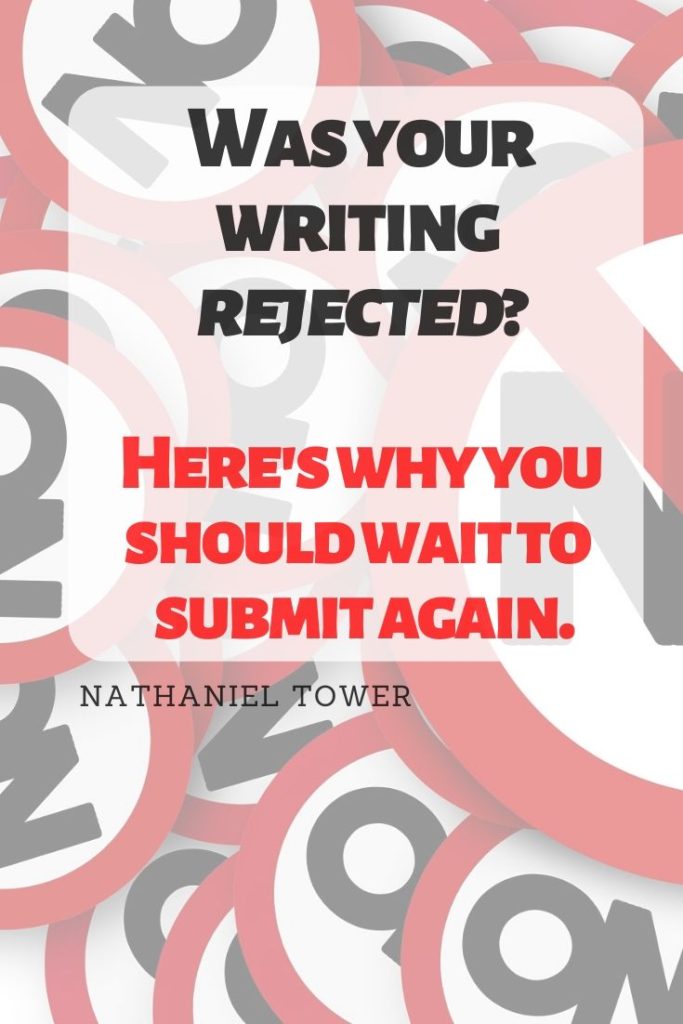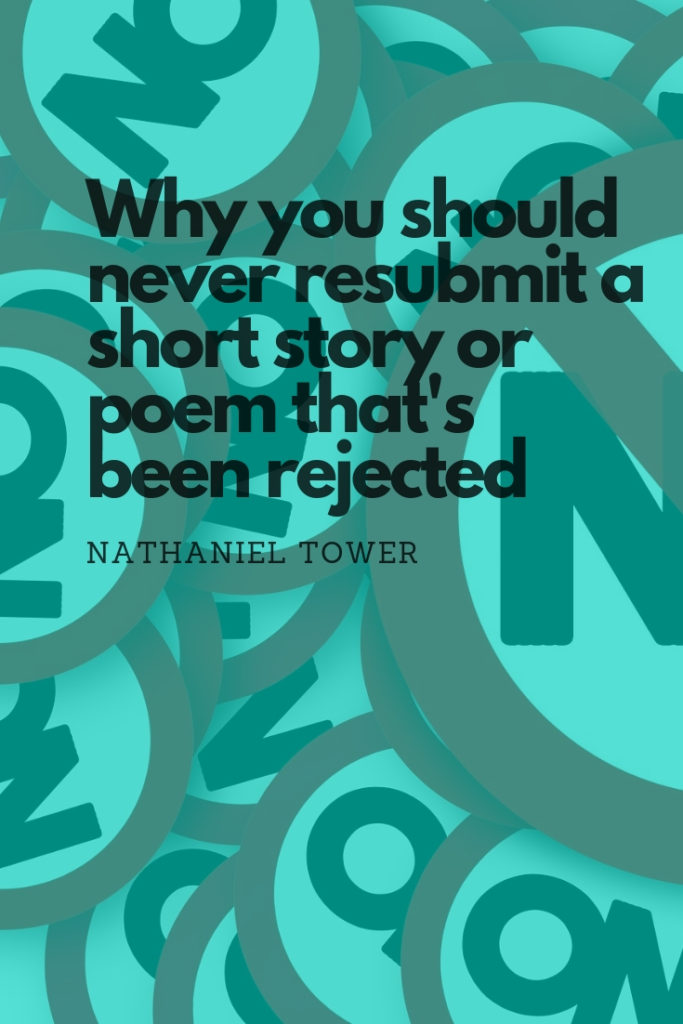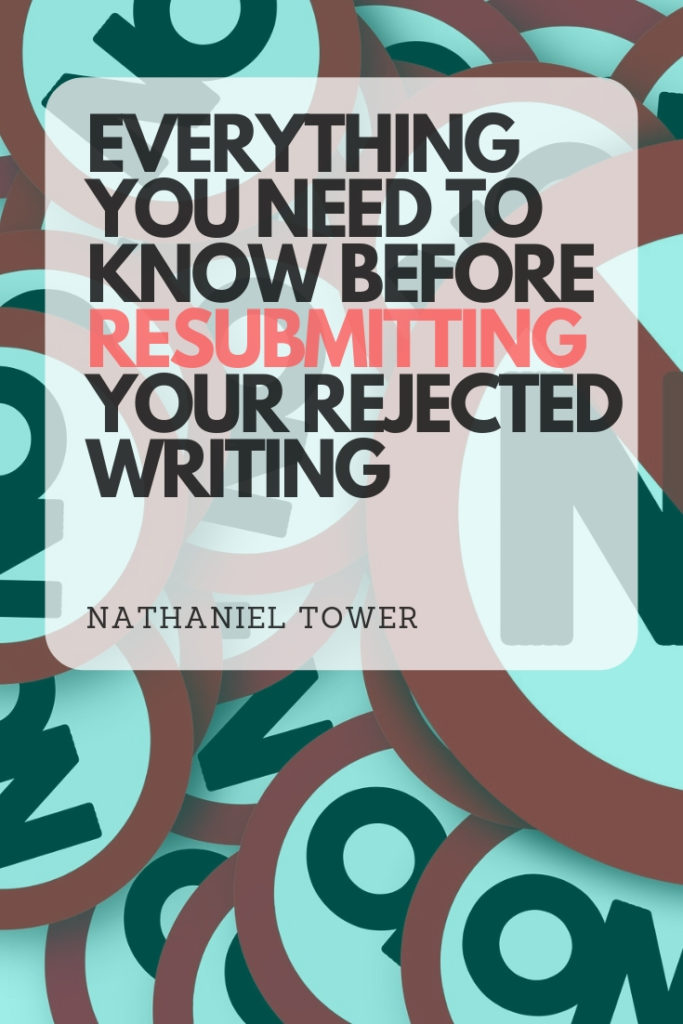Last Updated on October 27, 2019 by Nathaniel Tower
No.
Okay, maybe that was a little too curt of a response. So let’s dig into the topic a bit.
I often see writers asking if they should resubmit a story or poem that’s been rejected. Typically, they are talking about making revisions first and then sending it back to the publication. Most writers know better than to send the exact some story or poem that’s already been rejected back to the same publisher. But some do it anyway.
Regardless, the answer is still a resounding NO.


Here’s why I’m so adamant on this topic: THEY’VE ALREADY SAID NO!
A rejection is the equivalent of saying, “We don’t want to publish this piece.”
It’s not the equivalent of saying, “We don’t want to publish this piece in its current state.” If that’s what they meant, then that’s what they would have said (more on that later).
But what if I wait a month or submit it again during a new reading period?
Seriously, stop asking. The answer is clearly NO. If a publication rejects your story for any reason, then don’t send it back unless they explicitly indicate that they’d like to see it again. Some publications do this. They say something like, “We liked this story, but it wasn’t quite ready. Here’s what we didn’t like. We’d be happy to reconsider if you made these revisions and sent it back.”
If they say something like that, then it isn’t an outright rejection. That’s what we call a rewrite request. Consider it a tentative rejection. Or a tentative acceptance if you’re a glass-half-full kind of person.
But sending it a second time after it has already been rejected is at best a small annoyance. It’s a waste of the editor’s time. It’s also a waste of your time. There’s no chance that you’re going to get accepted.
But there’s no way an editor is going to remember that he/she rejected my story. They get way too many submissions to remember. I know my story is good. I think it’s worth trying again.
No, it really isn’t. And, yes, they will remember. Even if they get 10,000 submissions a day, the moment they read the first sentence they will think to themselves, “I know I’ve read this before. And I didn’t like it enough to publish it the first time. REJECT!” And then they’ll make a mental note to reject all future submissions by you.
And don’t try to pull some sneaky shit where you give it a new title and send it back a few months later. They will remember. And they will hold it against you. Just don’t send it back. Period. Not next week. Not next month. Not five years from now. There are hundreds of other publications out there. Send it somewhere else.
Let’s review: literary rejection is a firm NO. It doesn’t mean maybe. It means they don’t want to publish it. Luckily, there are plenty of other places out there who may want to publish it.
However, there is an exception: if the publication provides very specific feedback and indicates they really liked the piece but couldn’t publish it because of X, Y, and Z. Only then is it acceptable to resubmit your story, but only after you fix X, Y, and Z, and only after you query them first with something like this:
Thank you so much for your feedback on this piece. I think your advice was spot on, and I have gone back and revised it according to your recommendations. I think the piece is much stronger now, and I would love to resubmit for your consideration. Would that be acceptable? I really want it published in your magazine, especially since you gave me the advice to make it such a good finished product. Please let me know if it would be okay to resubmit.
If they don’t respond, don’t send it. If they respond that they’d be willing to see it again, then send it. If they say they’d rather see something new from you, don’t send it. It’s really pretty simple. Following this advice prevents you from wasting their time and annoying them.
Of course, just because a publication tells you that you need to fix X, Y, and Z to make it a publishable story doesn’t mean you actually need to fix those things. That’s just one opinion. Maybe the story is great as is. Maybe another publication wouldn’t recommend those changes. Here’s the most important thing to consider: do you want to make those changes? If not, then don’t do it. Don’t sacrifice the integrity of your writing just for the sake of a publication credit. It really isn’t worth it.
So let’s review one more time:
- If your story is rejected, don’t resubmit it to the same publication. Look for another place to get it published instead.
- Never try to trick a publication by renaming an old story that was rejected.
- It may be acceptable to resubmit a story or poem that you’ve revised per a publication’s recommendations, but only if they’ve given clear permission either in the original rejection or in a follow-up to your query.
- Don’t rewrite a story just for the sake of publication in one particular venue. Make sure you are happy with your work.
What do you do with your rejected stories? Share your experiences in the comments. And don’t forget to share this post on all your favorite platforms.


Thank you very much for posting this! It makes me cry, but that’s not as bad as ignorantly resubmitting a revised work that was flatly rejected and getting a bad reputation. Yes, the tears are still falling, but they will eventually stop.
Would you still discourage resubmission when the piece was rejected a decade ago, by different editors? Particularly, when audience is restricted to a smaller group of publications, and the author strongly believes the piece suits the publication’s stated focus.
In that particular scenario, it seems like it would be worth a shot to submit again. Has the publication’s stated focus changed, or does it just have different editors?